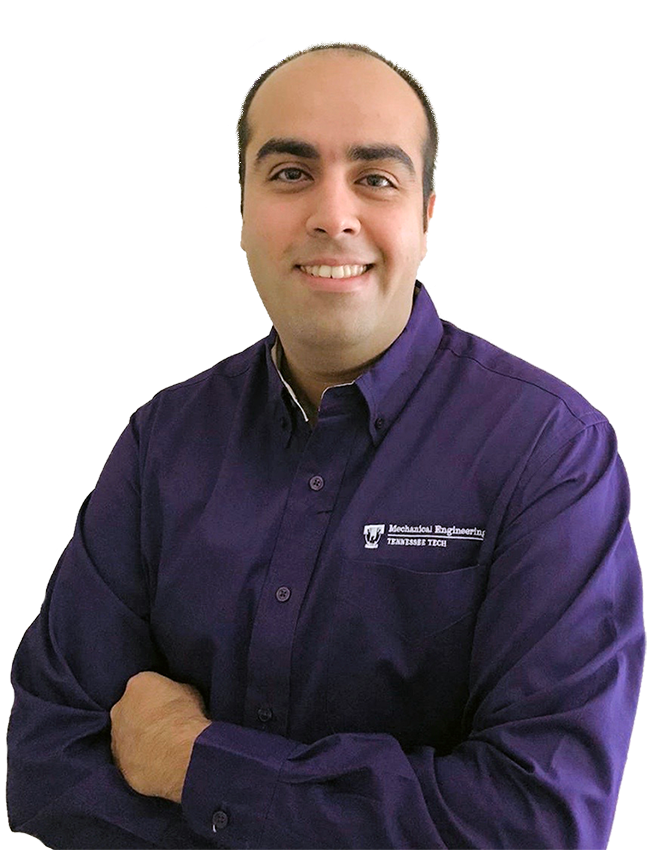College of Engineering
Arman Sargolzaei receives National Science Foundation CAREER Award for research into safety of ‘self-driving cars’
 A Tennessee Tech University mechanical engineering assistant professor has been awarded
one of the National Science Foundation’s most prestigious grants for supporting research
and STEM education.
A Tennessee Tech University mechanical engineering assistant professor has been awarded
one of the National Science Foundation’s most prestigious grants for supporting research
and STEM education.
Arman Sargolzaei has received a five-year, $500,000 Faculty Early Career Development (CAREER) Award from the NSF for his ongoing research in the safety of technology used in connected and autonomous vehicles (CAVs), also known as self-driving cars. The project, titled “Systematic Approach for Extensively (SAfEly) Testing and Verifying the Security of Connected and Autonomous Vehicles,” will directly impact the future of the technology and ultimately eliminate crash-related fatalities and save lives.
CAVs combine advanced technologies—wireless communications, software, advanced sensors, GPS navigation and others—to enable a vehicle to drive autonomously. A significant number of accidents could be prevented if autonomous vehicles actively cooperated with one another and coordinated with roadside infrastructure to predict the behavior of other nearby vehicles, consequently preventing crashes. This kind of automation has the potential to not only significantly improve driving safety, but also energy consumption, operating efficiency, environmental sustainability and land use, according to the Institute of Transportation Engineers.
But the autonomy used in these smart systems can also make them vulnerable to attacks, such as spoofing of a radar signal or influencing a vehicle’s sensors, affecting vehicle safety. Because the technology is so new, companies and researchers are just learning and evaluating how to ensure confidence that systems are secure.
“There has been some work towards testing, but the challenge is to develop a systematic technique or framework to test the security of CAVs,” Sargolzaei said. “The security of this technology is vital to ensuring that vehicles are safe.”
Sargolzaei, who is also Director of the Resilient, Autonomous, Networked Control Systems (RANCS) Research Group at Tech, has developed a large-scale vehicle-in-the-loop platform to test CAVs with the support of previous NSF funding. State-of-the-art sensors combine with virtual environments to simulate real-world crashes and driving scenarios, and the researchers conduct tests on potential faults and failures. The goal is to develop a technical language and framework for commercial testing for industry and regulators. The NSF CAREER Award will help Sargolzaei and his team of graduate and undergraduate researchers develop the extended-reality platform for testing and verifying the security of CAVs in a realistic and safe environment.
The award will also aid Sargolzaei in creating curriculum and educational models for K-12 schools and community colleges to boost STEM learning opportunities in underserved communities. One level of educational modules will provide general information on CAVs and security concerns, while another will use the hands-on opportunity presented by CAV research to illustrate STEM concepts such the equation of motion. “Students will be able to learn basic concepts in mathematics and physics through our extended-reality platform,” Sargolzaei said. “Educators will then be able to take the learning modules back to their home schools to implement them.”
NSF’s CAREER awards are designed to support the early career development of faculty who are integrating research and education in their work.
“The NSF CAREER program is one the most distinguished awards young faculty can receive, recognizing their potential to serve as role models in their research and institutions and to lead advances in their fields,” said Joseph C. Slater, dean of the College of Engineering. “Because the CAREER program integrates research and educational outreach, Dr. Sargolzaei’s award will create cutting-edge research opportunities for Tech students, as well as have tremendous impact on STEM education in K-12 classrooms.”
Sargolzaei joined Tech’s Department of Mechanical and Nuclear Engineering in 2020. His expertise is in applying linear and nonlinear control methods, machine learning, and artificial intelligence to the field of Networked Control Systems (NCSs) addressing safety, security and privacy concerns through extensive collaboration among multidisciplinary fields. He holds a doctorate in mechanical engineering from University of Florida and a doctorate in electrical engineering from Florida International University.
His doctoral dissertations focused on the security of NCSs and resiliency of multi-agent systems, and his knowledge of control theory, system identification, mathematics and statistics have contributed to the field’s understanding of the pathways of faults, failures and attack detection and compensation.
His peer-reviewed research on the theory and applications of cyber-physical systems, control systems and embedded systems has been published in more than 70 journal articles, and he has two active patents.
More information about Sarolzaei’s research in CAV safety and security and the RANCS Research Group can be found at: http://rancs-lab.com.
Lean More About Our Programs

